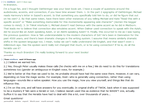Argent
Recently, at DragonCon, you talked briefly about detecting worldhoppers by examining their speech, and you mentioned Hoid using "coin" on Roshar, where there are no coins. Which overlapped with a question I had been meaning to ask - why would the people around him hear "coin" instead of "sphere"? Is this magical translation (something to do with Connection) malfunctioning for some reason? Or is the use of such out-of-context words solely for the benefit of the Cosmere-aware reader?
Brandon Sanderson
Yes, this has to do with magical translation. It's a quirk of trying to say something in the language, and the magic mixing up your intent. Someone who actually learns the local language wouldn't make this mistake.
Argent
Can I just make sure I understand your reply real quick? Are you saying that if Hoid, or someone with the same magical translation, were to learn a bit of Alethi language and culture, get more used to spheres being used as currency, then the magic would stop using "coin" and replace it with sphere? Or, in a sci-fi world, maybe "credit"?
Brandon Sanderson
If he was thinking about saying sphere, he'd say sphere with the magic.
If he accidentally said coin, through the magic, it would try to translate it into coin.
If he learned the language, there's little chance he'd make this mistake. It's a natural feature of learning another language--you tend to imitate those around you. It's still possible he'd make the mistake, but from my experience with second language acquisition, you don't accidentally say words in your native language expecting them to make sense in the new language.
Argent
But wouldn't this require, in his case, the Alethi language to have a word for "coin"? I thought what's happening is that he is saying "coin" (because it's more natural to him), and his magic - not knowing how to translate a word that doesn't exist in Alethi, just sends it across verbatim. Like how he used the word "dog" once, even though the Alethi can't have a word for it.
Brandon Sanderson
That's exactly what is happening--it's sending across the word verbatim.
Argent
Ah, so when you say that is he had said "sphere" in his own language, instead of "coin" (which would be weird to him, because he doesn't think of spheres as currency), then the translation would be fine. Not that he could say "coin" and have the magic interpret his intent and turn into "sphere".
Brandon Sanderson
Yes, to an extent. Remember, this is magical means through connection--not exact translation. But this is a short version of what is happening.
Torrieltar
*in response to Brandon's original answer* Is that how translated puns work, then? Based on your intent?
Brandon Sanderson
Yes, that has something to do with it. Though being aware that you're using the magic, and how it works, helps. For example, Hoid (very experienced with this sort of thing) can manipulate the magic and get a feel for what will work and what won't. It's a strange thing, because in most cases, you're actually SPEAKING the language, not speaking your own and having it translated. The magic pretends you were born and grew up in that place.
So you can speak in puns, and riddles, and so forth. However, there's latency from where you actually grew up that causes a kind of "blip" when you try to force through something that just doesn't translate. If you just let the magic do its thing, you'll naturally use idioms from the world you're in. But if you lock on to one from your past, it causes a kind of disharmony in the magic--reminding your spirit web that you don't actually speak the language. It will spit out a transliteration or verbatim phrase in this case.
You will rarely see Hoid having the trouble that Vasher does in using the language and magic, as Vasher doesn't really care. But you will still see even the most expert slip up now and then.
There's an extra layer on this that I don't focus too much on, in that the books themselves are in translation--so when Hoid's using a pun, he's filtering his intent to pun through the magic, into Alethi, creating a local pun that works in the language--then that is in turn translated to one that works in our language.

